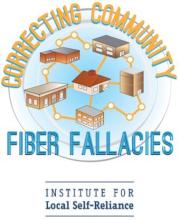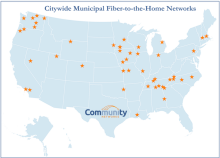Addressing UPenn Report: Dud Data, Unsuitable Approach
For the second week in row, our staff has felt compelled to address a misleading report about municipal networks. In order to correct the errors and incorrect assumptions in yet another anti-muni publication, we’ve worked with Next Century Cities to publish Correcting Community Fiber Fallacies: Yoo Discredits U Penn, Not Municipal Networks.
Skewed Data = Skewed Results
Professor Christopher S. Yoo and Timothy Pfenninger from the Center for Technology, Innovation and Competition (CTIC) at the University of Pennsylvania Law School recently released "Municipal Fiber in the United States: An Empirical Assessment of Financial Performance." The report attempts to analyze the financial future of several citywide Fiber-to-the-Home (FTTH) municipal networks in the U.S. by applying a Net Present Value (NPV) calculation approach. They applied their method to some well-known networks, including Chattanooga's EPB Fiber Optics; Greenlight in Wilson, North Carolina; and Lafayette, Louisiana's LUS Fiber. Unfortunately, their initial data was flawed and incomplete, which yielded a report fraught with credibility issues.
So Many Problems
In addition to compromising data validity, the authors of the study didn’t consider the wider context of municipal networks, which goes beyond the purpose of NPV, which is determining the promise of a financial investment.
Some of the more expansive problems with this report (from our Executive Summary):









